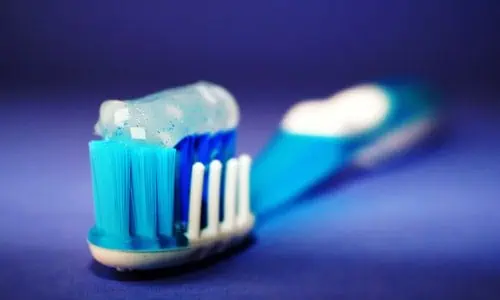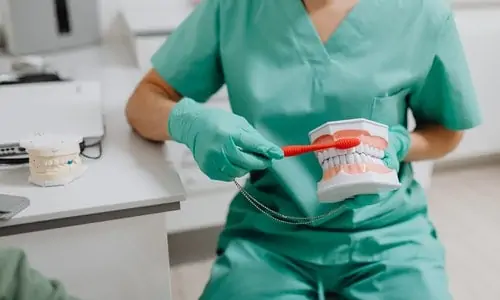Blog
Top 5 Signs Of A Cavity

One of the top priorities of your dentist in Douglasville is to prevent dental problems from occurring in the first place. However, there’s one condition that affects more than 90% of adults over the age of 20 – cavities. Treating cavities is usually quick and easy, especially if they’re caught early. This is one reason why it’s so important to see your dentist every six months. In between appointments, it’s also important to be able to recognize the signs of a cavity so you can seek treatment sooner rather than later.
1. Hot & Cold Sensitivity
Cavities are a result of weakened tooth enamel, allowing the nerves and roots of a tooth to become exposed. This can cause increased sensitivity when eating or drinking something hot or cold. Someone who has a cavity may experience that sudden surge of pain that shoots through a tooth when the inner workings of the tooth come in contact with the temperature extremes.
2. Sweet Sensitivity
Similar to hot and cold tooth sensitivity, another common complaint of those with a cavity is sensitivity to sweets. Your tooth may hurt briefly after biting into a piece of candy or chocolate bar, then the pain will most likely subside. However, even if the pain goes away quickly, you should still consider seeing your dentist in Douglasville if this remains consistent whenever eating sweets.
3. Staining
Some people have tiny white spots on their teeth that formed during childhood. These are typically nothing to worry about. However, if you notice a new white speckle, or even worse, a dark brown, gray, or black area on a tooth, it may be caused by decay. There are other potential explanations for tooth discoloration so it is important to get it checked out sooner rather than later.
4. Pitting
A cavity is essentially an area of decay in the tooth. Decay shows itself as a pit or a small hole. In the early stages of cavity development, this pitting may not be noticeable with the naked eye. But your dentist in Douglasville would be able to see this through dental x-rays or an exam. Now, if you do happen to see a hole in your tooth, you should schedule an appointment as soon as you can. This may be a sign of a large cavity that may require a dental crown restoration or it could be a symptom of an old filling falling out. Either way, it’s important to have it treated quickly.
5. Toothache
The most common sign of a cavity is a persistent toothache. This pain can seem to come on suddenly or you may notice it after eating. The pain may also get worse when chewing or biting down. It’s important to remember that any pain in your mouth is usually a sign that something isn’t right, and you should get to your dentist for a checkup.
Knowing what to look out for is one of the best ways to make sure you catch and treat a cavity in the earliest stages. If you notice any of these signs of a cavity, we encourage you to schedule an appointment with your dentist in Douglasville today.
Tips For Seeing Your Dentist For the First Time in a Long Time

Oral health is a crucial part of your overall health, and it’s important to see your dentist in Douglasville at least every six months to maintain a healthy mouth and healthy body. However, we understand that there are some things that can keep a patient from seeing us as often as they should. If it’s been a couple of months, years, or even decades since you’ve seen your dentist, you’re not alone, and we’re here to help.
What to Expect
Your visit to a dentist for a long time may be intimidating, but the best thing you can do is prepare yourself for what to expect.
- Exam – Every patient that visits us will receive a comprehensive oral exam. This means that we will take a gentle look inside your mouth to look for any signs of decay, gum disease, or other problems.
- X-rays – No matter how long it’s been since a patient has seen us, we will take x-rays so we can get a closer look at what’s happening beneath the surface of what’s visible to the naked eye.
- Review of Oral Health – During your exam, we encourage you to review your oral health with your dentist in Douglasville. If you have concerns, pain, are grinding your teeth, or want to talk about enhancing your smile through cosmetic dentistry, now is the time to share that information.
- Review of Overall Health – You will need to complete a health history form prior to your visit. Make sure to be honest about any medications you’re taking or health problems you have. Believe it or not, a lot of health problems can impact your oral health, so it’s important for your dentist to know this information.
How To Prepare for Your Appointment
Knowing what to expect at your appointment is important, but it’s also important to prepare yourself for the visit. Try to schedule your appointment for a time that’s convenient for you and during a day when you have limited chances for other stressors. Also, it’s not uncommon for patients who haven’t visited in a while to need more treatment, such as a few fillings. Understanding this before you’re in the dental chair can help keep you relaxed during your exam. If you have dental anxiety, it’s nothing to be ashamed of. Make sure you mention this during scheduling and during your appointment. Also, take the following steps to help reduce anxiety:
- Avoid caffeine prior to your appointment
- Bring your phone and headphones and ask if you can listen to music during your appointment
- Take deep, slow breaths to remain relaxed
- Never hesitate to use hand signals to let your dental team know you need a break
There are a number of reasons why patients put off visiting their dentist in Douglasville. Sometimes it’s due to fear, or maybe life is just too busy and you forget. No matter what your reason is, we promise to care for you in a kind and understanding environment without judgment. Schedule an appointment with us today!
The Surprising Side Effect of Gum Disease

Your dentist in Douglasville has known for quite some time that there is a strong link between gum disease and other whole-body concerns, such as an increased risk for heart disease and stroke. But recent research by the American Academy for Cancer Research has also shown a connection between gum disease and the development of colon cancer. During this Colorectal Cancer Awareness Month, we want to share the findings so our patients can do everything possible to protect themselves from gum disease and the potential negative side effects.
Research Results
This new long-term study followed the health of 42,486 Americans, both men, and women, for several decades. The goal was to monitor the health, diet, and results of colonoscopies to determine if there was any possible link between gum disease and colon cancer. While the results did support the theory, researchers say more studies are needed to back up these findings.
Scientists were interested in looking at two particular types of intestinal lesions that often precede colon cancer — serrated polyps and conventional adenomas — as well as participants’ history of gum disease. They found that those patients who had a history of gum also had:
- A 17% increased risk of having a serrated polyp
- An 11% increased risk of having a conventional adenoma
- A 20% increased risk of having a serrated polyp if the participant had lost four or more teeth
6 Signs of Gum Disease
Gum disease can present itself in a number of ways, but there are some signs that are more common such as:
- Bad breath that doesn’t go away
- Red, swollen gums
- Gums that bleed
- Loose teeth
- Gum recession
- Pain when chewing
- If you recognize any of these signs of gum disease, call your dentist in Douglasville to schedule an appointment as soon as you can. When gum disease is caught in its earliest stages it can often be treated successfully. However, when gum disease becomes more serious, it can become irreversible.
Reduce Your Risk of Gum Disease
It’s important to remember that uncontrollable factors such as age and genetics can increase someone’s chances of getting gum disease. But there are also habits and lifestyle factors that we can control that can also increase the risk. Following these tips from your dentist in Douglasville can reduce the likelihood of developing gum disease:
- Follow a proper oral hygiene routine of brushing twice a day and flossing once a day
- Eat a well-balanced diet
- Stop using tobacco products
- Keep seeing your dentist for bi-annual checkups and cleanings
Gum disease isn’t something to take lightly, and it’s crucial to monitor any changes that occur in the mouth to catch problems before they have a chance to become bigger concerns and cause health problems. If you notice any of the signs of gum disease or it’s been longer than six months since your last visit, schedule a dental appointment today.
Spring Cleaning Tooth Tips

Spring is a time when many people start to clean out their homes after the winter season, opening windows, cleaning out closets, and even scrubbing baseboards. When it comes to your dental health, your dentist in Douglasville wants to remind all of our patients and neighbors that giving your teeth a “spring cleaning” too can help protect teeth. Here are some tips to help you get started.
- Get a New Toothbrush
You should replace your toothbrush at least every 3-4 months, according to the American Dental Association. If you’ve gone all winter without treating yourself and your teeth to a new toothbrush, now’s the time to start fresh. Choose a toothbrush that has soft bristles, as medium or hard bristles can actually damage your teeth. If you’re using a manual toothbrush, consider upgrading to an electric version. Your dentist in Douglasville can help you find the best toothbrush for you.
- Check Your Supplies
One key part of spring cleaning a house is to remove all of the expired stuff from the fridge and pantry. Don’t forget to also check your dental supplies. Like most things, dental care items like toothpaste and mouthwash have expiration dates, and it’s important to toss anything that has expired. This may also be a time to try out a new toothpaste or mouthwash. Again, your dentist can make recommendations as to what new items are available and which may be right for you
- See Your Dentist in Douglasville Regularly
While spring is when most people deep clean their house, it’s also a wise time to schedule a checkup and dental cleaning, especially if it’s been longer than six months since your last visit. Regular dental checkups and cleanings are crucial to maintaining a healthy smile all year round. Preventive dentistry appointments help:
- Remove plaque buildup that at-home brushing and floss can’t touch
- Catch potential problems early when they’re often easier to treat
- Give your dentist a look under the surface of your teeth through dental x-rays
Oral & Overall Health
There’s a strong connection between oral health and overall health, so it’s important to take care of both. Seeing your dentist twice a year, replacing your toothbrush, toothpaste, and mouthwash regularly, and brushing and flossing every day can go a long way in protecting your smile against decay and oral health diseases such as gum disease.
Celebrate the spring season by treating your teeth to a gentle dental checkup and cleaning. Call us to schedule an appointment with your dentist in Douglasville today!
Oral Health & COVID-19 Recovery

There have been close to 400 million cases of COVID-19 worldwide since the beginning of the pandemic. While one of the telltale signs of COVID can be loss of taste, among many other symptoms, there may be additional oral health concerns associated with a COVID-19 infection both during illness, as well as recovery. Your dentist in Douglasville is here to explain some potential oral health side effects of COVID-19.
Lesions or Ulcers
According to a study published in the Journal of Dental Research, over 80% of patients that were hospitalized with COVID-19 noticed lesions or ulcers in their mouths. Why would this happen as a result of respiratory disease? Well, the truth is, the respiratory system begins in the mouth and the nose, so it’s not uncommon for these areas to be affected. Keep in mind, ulcers should go away on their own. If they don’t schedule an appointment with your dentist in Douglasville. Besides ulcers and lesions, some patients also experience something coined “COVID tongue.” The symptoms of COVID tongue can range from loss of papilla (the teeny bumps on the tongue), enlarged tastebuds, or a burning taste or sensation.
Dry Mouth
Dry mouth is estimated to affect up to 65% of the population and is not a unique side effect of COVID-19. However, it can develop or become worse during or after infection. When we get sick with COVID, the virus can cause salivary glands to underproduce saliva. Healthy saliva flow is what allows our mouths to feel moist and comfortable, and it also helps reduce the risk of decay. Without enough saliva, the mouth may feel overly dry, you may experience bad breath, and you may be more likely to develop serious health problems such as gum disease. If you’re suffering from a dry mouth, drink lots of water every day, chew gum, and make sure to talk with your dentist in Douglasville.
Inflammation
One of the main concerns associated with COVID-19 is how the body responds to the infection, causing sometimes extreme levels of inflammation in certain parts of the body. This inflammation can also occur in the mouth. The gums are usually the most obviously affected, and COVID-19 long-haulers may notice red, swollen, and sometimes bleeding gums after recovery. It’s important to keep an eye on gum inflammation as it can also lead to or be a sign of gum disease. Gum disease does have connections to overall health and has been linked to an increased risk of heart disease, stroke, and respiratory disease. With that said, those with active gum disease when they become infected with COVID are more likely to have a serious case.
While some people find COVID-19 recovery simple, some of the 400 million people infected continue to experience long-term side effects. If you’re one of them and you have lingering oral health side effects, don’t hesitate to contact your dentist in Douglasville to schedule an appointment.
What Toothbrush Should I Use?

There are so many different kinds of toothbrushes to choose from, and while they may all look the same outside of the color, not all brushes work the same. In fact, there are some big differences between the types of toothbrushes available, and it can be difficult to know which one will be right for you. To help you find the perfect toothbrush to fit your oral health needs, check out this guide from your dentist in Douglasville.
The Bristles
One of the most important things to consider when deciding on which toothbrush to use is the bristles. When your dentist in Douglasville considers the bristles of a toothbrush, they look for two things – the shape and the density.
- Shape – Bristles are either straight or rounded, and this difference is sometimes very subtle, so make sure to look closely. Rounded bristles are usually recommended for most people as they’re effective at removing plaque and bacteria while also being gentle. Straight bristles, on the other hand, can cause gum or enamel damage, especially if you brush too hard.
- Density – Toothbrush packaging will also list information about how dense the bristles are. You’ll see this referenced as soft, medium, or hard. Most likely, your dentist in Douglasville will recommend that you use a soft-bristled toothbrush as opposed to a medium or hard. Soft bristles are gentle enough to get a thorough clean while not causing damage to your teeth or gums.
The Size
Sometimes, bigger is better. But not when it comes to your toothbrush. You don’t want a toothbrush that you can’t comfortably fit in your mouth or one that’s too difficult to manage. Look for a toothbrush that has an appropriately-sized head and handle. The head should be large enough to be able to brush two teeth at once but not too large that you can’t reach your back teeth.
The Cost
The cost of toothbrushes can vary greatly depending on a variety of factors. The most obvious is whether you’re looking to buy a manual toothbrush or an electric toothbrush. Electric toothbrushes and their replacement heads are often more expensive than manual toothbrushes. However, if you’re someone who finds manual toothbrushes difficult to use, an electric toothbrush may be recommended. Don’t worry though, there are now affordable electric toothbrushes that your dentist can recommend.
The ADA Seal of Approval
No matter if you choose a manual toothbrush or an electric toothbrush, make sure you look for the ADA Seal of Approval. Toothbrushes that have earned the seal have undergone testing to make sure they’re safe, durable, and won’t increase the risk of gum or enamel damage.
So, which toothbrush should you use? The one that you will pick up every morning and night and use for two minutes. However, we also want to make sure that your toothbrush isn’t doing more harm than good, so talk with your dentist in Douglasville about which toothbrush you typically use and see if they have any other suggestions for you based on your specific oral health needs.
The Benefits of Using an Electric Toothbrush

When it comes to brushing your teeth, it’s most important to your dentist in Douglasville that you do it twice a day. However, choosing which type of toothbrush to use can be confusing. While both electric and manual toothbrushes can get the job done, when it comes to keeping your teeth clean, there are some advantages to using an electric toothbrush.
- May Be More Effective
While the jury is still out on whether or not electric toothbrushes are officially better at removing plaque and bacteria, studies have shown that this just may be the case. Since electric toothbrushes pulse at such a fast rate, they can flush out hard-to-reach areas.
- A Two-Minute Timer
Your dentist in Douglasville recommends that everyone brush their teeth for two minutes every single time. This is best broken out into 30-second increments for each section of your teeth – the lower left quadrant, upper left quadrant, lower right quadrant, and upper right quadrant. However, it’s really easy to lose track of time and cut a brushing session short. Most electric toothbrushes have built-in timers to help guide you through a thorough, two-minute cleanse.
- Under Pressure
Many patients believe that the more they scrub their teeth the cleaner they’ll be. However, using too much pressure to brush your teeth can actually cause more harm than good. A tough scrub can weaken tooth enamel and also cause gum recession. Some electric toothbrushes have pressure sensors to keep you from brushing your teeth too hard.
- Easy To Use
Some people, such as those with mobility problems or arthritis, may find a traditional manual toothbrush too hard to use properly. However, with an electric toothbrush, the brush does most of the work for you so you can still get a good, clean mouth.
- Consistency is Key
Did you know that you may be using different levels of pressure to brush different areas of your mouth? In fact, it’s not uncommon to brush the first section of your teeth harder than that last section. An electric toothbrush can help keep a consistent pressure in all areas of your mouth, ensuring an even clean.
Some Disadvantages
It wouldn’t be fair if we didn’t also talk about some potential disadvantages to using an electric toothbrush, so let’s take a look at a few.
- Electric toothbrushes are more expensive than manual toothbrushes
- If you’re someone who travels a lot, some electric toothbrushes can be hard to pack
- They require regular charging which can be inconvenient for some people
- If you don’t use the toothbrush properly, it can damage your teeth and gums, just as a manual toothbrush can
Selecting the best toothbrush for you can seem intimidating, however, your dentist in Douglasville is here to help. Schedule an appointment today!
Is Fruit Good for Your Teeth?

Teeth are one of the most important aspects of your body and your overall health, and it’s essential to take care of them with good oral hygiene practices. This means regular brushing, flossing, and visiting your dentist in Douglasville twice a year. However, what you eat can also play an important role in keeping your teeth healthy and cavity-free. When it comes to fruit, could this healthy snack actually be bad for your teeth?
Sugar & Acid
Two of our teeths’ worst enemies are sugar and acid, and some of the most popular fruits contain high levels of both of these. When you eat foods that are high in sugars, even natural sugar like many fruits, bacteria in your mouth use those sugars to produce acid. This acid can weaken tooth enamel. Additionally, some fruits are both high in sugar and are naturally acidic, making them a double danger to teeth.
Signs of Weakened Enamel
When tooth enamel weakens, it leaves teeth at increased risk for decay and cavities. Some signs of weak enamel include:
- Sensitive Teeth
- Cracking
- Discoloration
- More Transparent Teeth
If you notice any of these symptoms, contact your dentist in Douglasville.
Best Fruits for Teeth
When searching for the best fruits that will give you a boost of valuable nutrients and protect your teeth, consider choices that have high water content, such as apples, melons, and pears. Another surprising beneficial fruit is strawberries. Even though they’re bright red and can stain, they contain malic acid, which has been shown to help whiten enamel.
Worst Fruits for Teeth
Some of the worst fruits for teeth are probably obvious as they’re citrusy and may even make you pucker when you eat them. Others may come as a surprise. Two of the worst fruits for teeth are lemons and pineapple. Both of these sour snacks are acidic and damage enamel. Another fruit that can also be bad for teeth is bananas. Although bananas pack a valuable nutritional punch, they’re also high in starch. Starch can linger around in the mouth and between teeth, encouraging bacteria development.
Fruit vs. Fruit Juice
When it comes to choosing to get your vitamins through fruit or fruit juice, your dentist in Douglasville will always recommend whole fruits over juice. Fruit juice, even fresh-squeezed juice, usually contains higher levels of sugar and acid compared to raw, whole fruits.
Eating fruit is a necessary part of a healthy diet, and you should incorporate it into your meals. To help protect your teeth in the process, enjoy acidic or super sugary fruits in moderation and rinse your mouth with water afterward.
What Are Tonsil Stones?

So you’ve probably heard of kidney stones, but what about tonsil stones? It’s actually a common condition that your dentist in Douglasville can help you understand a little bit more about. For some patients, tonsil stones are a recurring condition; for other people, they might never experience them in their lifetime.
Some Common Causes of Tonsil Stones
Stand in front of a mirror, open up, and say, “ah.” When you see the tonsils in the back of your throat, take note of all of the nooks and crannies. These are the perfect places for bacteria to hide out and become trapped. When this happens, the bacteria and debris can form tiny white tonsil stones as they harden over time. Some of the most common causes of why tonsil stones occur include a wide range of bacterial and viral infections such as:
- Streptococcus bacteria
- Adenoviruses
- Influenza virus
- Herpes simplex virus
- Enteroviruses
Tonsillitis: Understanding the Signs and Symptoms
Tonsillitis is generally caused by painful inflammation and swelling in your tonsils. However, there are some other symptoms you need to be on the lookout for if you or someone in your family has tonsil stones:
- Bad breath
- Frequent sore throats
- Earaches
- Trouble swallowing
You should also be mindful if you have an ongoing cough or persistent swelling. It’s best to see your doctor or dentist in Douglasville to get professional advice.
How Can You Prevent Tonsil Stones?
Chronic tonsillitis is the perfect match for tonsil stones. So, the best way to ensure you’re free from tonsil stones in the future is to consider having your tonsils removed. This is also known as a tonsillectomy and involves removing your tonsil tissue completely, so there’s no more inflammation and issues for you or your kiddo. Once you’re healed, you can take comfort in knowing you’ll never experience the discomfort of a tonsil infection or unwanted tonsil stones ever again!
Are you having trouble with tonsil stones? You can schedule an appointment at our dental office in Douglasville so we can talk with you about your experience and goals. We can work with you and your primary care physician to help you get rid of tonsil issues and stay healthy. Please call us to get started!
4 Ways to Straighten Your Smile

Did you know that crooked teeth can affect more than just your appearance? Teeth that are overlapped or crooked can affect your bite, make it difficult to properly clean your teeth, and even cause problems with digestion. But there’s good news — you don’t have to live with a crooked smile. In fact, your dentist in Douglasville can offer you ways to straighten your smile, without braces!
1. Tooth Recontouring
Adults who have minor misaligned teeth and who want a straighter smile can sometimes benefit from a simple tooth recontouring treatment. Tooth recontouring involves removing portions of the enamel in order to change the shape of your teeth.
2. Bonding
Another simple way to transform the appearance of your teeth is through a cosmetic dentistry treatment called bonding. Bonding is usually appropriate for one or two teeth that sit farther back than other teeth. Your dentist in Douglasville will apply bonding material to build up the tooth structure so it becomes aligned with the neighboring teeth.
3. Veneers
Dental veneers may also help straighten teeth that are a bit more overcrowded or crooked than those that can benefit from contouring or bonding. Veneers are thin slices of porcelain that are created to match the best shape, size, and color for your smile. Your dentist will remove a tiny portion of the front surface of your teeth to make room for the veneer, then affix the shell in place. This form of cosmetic dentistry can also cover up discoloration or smaller gaps.
4. Invisible Aligners
Patients who have crooked teeth that can’t be fixed through the other treatments may be a candidate for invisible aligners. These thin plastic aligners are worn every day and only removed to eat and brush your teeth. They can effectively move teeth into the desired position, similarly to traditional metal braces. While these revolutionary aligners can certainly transform a smile, they may not be appropriate for everyone. Talk with your dentist in Douglasville about whether clear aligners may be right for you.
Should You Straighten Your Teeth At Home?
While we’re talking about clear aligners, it’s important to mention the surge in at-home clear aligner treatment. However, straightening your teeth at home, either with these aligners or by trying to make your own braces, can result in some negative side-effects such as:
- Tooth decay
- Broken teeth
- A bad bite
- Pain in your jaw or teeth
It’s always best to talk with your dentist in Douglasville about any dental treatment before trying to treat it on your own.
Signs You May Need to Straighten Your Teeth
You may not know if crooked or overlapping teeth are affecting your overall health, but there are often some telltale signs that you will benefit from a smile straightening treatment including:
- Difficulty chewing
- Problems with speech
- Clicking jaw
- Top and bottom teeth don’t allow your jaw to close while at rest
- Mouth breathing
If you’re unhappy with your smile or notice any of the signs above, schedule an appointment with your dentist. You’ll talk about what’s bothering you and your dentist will perform an exam and possibly x-rays to get a better idea of what treatment may be the best way to straighten your teeth.
